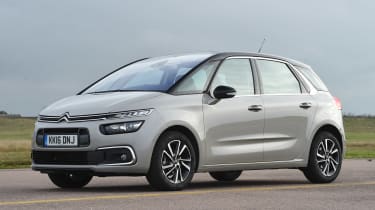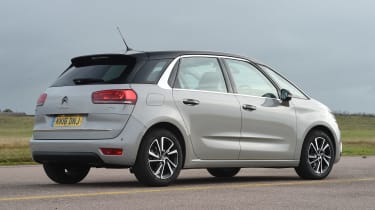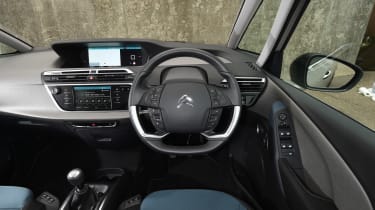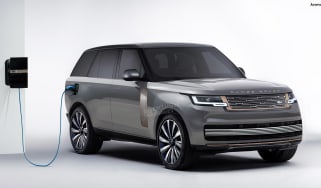Used Citroen C4 Picasso (Mk2, 2013-2022) review
A full used buyer’s guide on the Citroen C4 Picasso, covering the C4 Picasso Mk2 that was on sale between 2013 and 2022
Verdict
The C4 Picasso collected an array of awards during its life. Many of those were given by Auto Express and CarBuyer, with the first in 2014, when the car was pronounced Best MPV in the Auto Express New Car Awards. The Citroen repeated the feat for the next four years, while CarBuyer gave it the same award three times in succession. We loved the car’s ability to transport seven people in comfort, its sensible purchase price and running costs, and its generous equipment. However, although the Citroen was impressive when new, as a used buy things can be different. Owners report that quality and reliability can be a problem, so be scrupulous with your checks and enquire about a warranty before paying.
Citroen has a history of innovating and producing family-friendly cars, and nowhere was this more apparent than with the range of MPVs that started with the Synergie in 1994. Sold in some markets as the Evasion and also available in Fiat, Lancia and Peugeot forms, these seven-seat MPVs were a regular sight on UK roads.
The Synergie was replaced in 2002 by the C8 (also developed in conjunction with the above brands), and then just four years later came the equally stylish C4 Picasso and Grand C4 Picasso, with five and seven seats respectively. An all-new model appeared in 2013/14, and it raised the bar in terms of quality, refinement, equipment and usability. So how does the C4 Picasso rate as a used buy a decade after its introduction?
History
The C4 Picasso Mk2 arrived in July 2013, with 1.6-litre HDi 90 or e-HDi 115 diesels, and VTi 120 or THP 155 petrol engines. Whereas the petrol engines came only with a manual gearbox, the diesels were offered in six-speed automatic (ETG6) form.
More reviews
Car group tests
In-depth reviews
Long-term tests
Road tests
- Citroen C4 Picasso Touch Edition 2016 review
- Citroen Grand C4 Picasso autonomous ride review
- New Citroen C4 Picasso PureTech 130 2016 review
- Ford C-MAX vs Citroen C4 Picasso
Used car tests
The Grand C4 Picasso made its debut in January 2014, with the same engines as its five-seat sibling, plus a 2.0-litre BlueHDi 150. A facelift in September 2016 brought a fresh nose, redesigned front and rear lighting, a new trim hierarchy, improved infotainment connectivity and a 1.2 PureTech petrol engine in 109bhp and 128bhp forms. The range was renamed C4 Spacetourer and Grand C4 Spacetourer in May 2018; a BlueHDi 160 engine also joined the range, available only with an EAT8 eight-speed automatic transmission.
Which one should I buy?
If you’ll load up your Citroen regularly, we’d avoid the smaller engines. We’d also steer clear of the EAT6 auto because it’s not very slick, but the EAT8 auto and manual gearboxes are much better.
The entry-level Touch came with 16-inch alloy wheels, air-con, rear parking sensors, DAB radio, a 7.0-inch touchscreen and cruise control with speed limiter. The mid-range Feel added 17-inch alloys, front parking sensors, navigation, power-folding door mirrors and roof bars (Grand C4 Spacetourer only). Range-topping Flair also had a glass roof, a reversing camera, blind-spot monitoring and half-leather trim.
Alternatives to the Citroen C4 Picasso
By the time the Grand C4 Spacetourer went out of production last year, there were still several MPVs available, although many were derived from vans. These included the Citroen Berlingo and Spacetourer, Ford Tourneo/Grand Tourneo Connect, Mercedes V-Class, Peugeot Rifter, Toyota Proace Verso, Vauxhall Combo Life plus Volkswagen’s Caddy Life, Caddy Maxi Life and Multivan. Some MPVs were standalone products, though, including the BMW 2 Series Active Tourer, Ford’s S-Max and Galaxy, and the Volkswagen Touran. During the Citroen’s reign, the Vauxhall Zafira was also offered, along with the Renault Scenic and Grand Scenic plus the SEAT Alhambra and Volkswagen Sharan.

Many MPV buyers have switched to a seven-seat SUV instead, such as the Peugeot 5008, Kia Sorento, Mitsubishi Outlander, Hyundai Santa Fe or Nissan X-Trail. These look more stylish but are invariably less practical.
What to look for
Electrics
The most common bugbear is electrical glitches, so check everything, including infotainment, air-con, door locks and lighting.
Quality
Problems arising from the general build quality aren’t all that unusual. Damaged interior trim and squeaky windows are par for the course.
Towing
The Grand C4 Picasso was named Best MPV in the 2014 Tow Car Awards. Maximum towing weights vary between 1,150kg and 1,700kg.
Running gear
An array of mechanical problems can arise, including faulty electronic parking brakes, diesel engine oil leaks and suspension wear.
Interior
The Grand C4 Picasso is almost 17cm longer than its five-seat sibling, so there’s a lot more interior space and, of course, you get that extra row of seats, although they’re best suited to children. The Grand C4 Picasso can also stow up to 2,181 litres of luggage compared with 1,851 for the C4 Picasso.
With no significant price premium to pay when buying the bigger car, we’d opt for one for its extra space, usability and saleability. There’s decent versatility, but row three is tight for legroom and headroom for adults. While cabin space is generally good, some owners aren’t so impressed by a few aspects of the cabin design.
Prices
About a third of all Picassos have an automatic transmission, while virtually all Picassos and most Grand C4 Spacetourers have a diesel engine; only the C4 Spacetourer is more plentiful in petrol form.
To check prices on a specific model head over to our valuation tool.
Running costs
All C4 Picassos and Grand C4 Picassos – as well as the C4 Spacetourer – need to be serviced every 12 months or 16,000 miles. The three-level service schedule runs in sequence: Interim costs £205 for all models (£195 using pattern parts), while Main is set at £255/£225. The Major service is £375 for diesels (or £315), but for three-cylinder petrol editions it’s £405/£345, while you’ll pay £425/£375 for four-cylinder petrol models. On top of this, fresh brake fluid is needed every two years (at £70), and new coolant is required every four years or 83,000 miles (£90).
All C4 Picasso engines have a cambelt that needs to be replaced every 10 years or 116,000 miles; expect a Citroen dealer to charge £499 for this. The C4 Picasso came with a three-year/60k-mile warranty when new.
Recalls
These Citroens don’t have a good record when it comes to recalls, with 22 campaigns issued against the C4 Picasso and three for the C4 Spacetourer. However, there were four separate recalls because of faulty mechanisms that could lead to the doors opening as the car was being driven, while another three were issued for the same brake servo glitch.
Other potential problems include faulty gear selectors and fuel leaks on early cars (the latter was behind two campaigns), while front-suspension failures led to another two recalls. Further maladies included the bonnet skin detaching, starter-motor failures, oil leaks and faulty airbags, as well as high exhaust emissions. The C4 Spacetourer recalls dealt with the engine overheating, oil leaks and excessive exhaust emissions.
Driver Power owner satisfaction
The last time the Citroen appeared in a Driver Power new- car survey was back in 2020. That was in Spacetourer form, which came 28th out of 75. The C4 Picasso had previously managed 42nd in 2017, 96th out of 100 in 2016, and 77th in 2015. Looking at that 2020 result, owners liked the styling, versatility, brakes and performance, but not the quality, reliability, ergonomics or the scarcity of safety features.
Looking to sell your current car quickly and for a good price? We’ve partnered with Motorway to bring you the best offer from its network of UK dealers...







